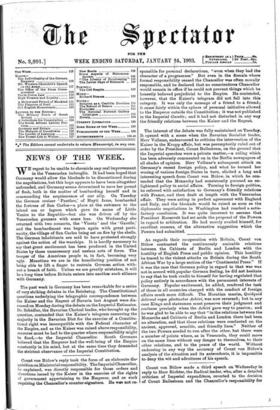The interest of the debate was fully maintained on Tuesday.
It opened with a scene when the Bavarian Socialist leader, Herr Vollmar, endeavoured to criticise the intervention of the Kaiser in the Krupp affair, but was peremptorily ruled out of order by the President, Count Ballestrem, on the ground that the Imperial speeches were a private matter,—a ruling which has been adversely commented on in the Berlin newspapers of all shades of opinion. Herr Vollmar's subsequent attack on Germany's recent foreign policy, and what he termed her wooing of various foreign States in turn, elicited a long and interesting speech from Count von Billow, in which he con- tended that the Monarchy had consistently pursued an en- lightened policy in social affairs. Turning to foreign politics, he referred with satisfaction to Germany's friendly relations with France, and then dealt at length with the Venezuelan affair. They were acting in perfect agreement with England and Italy, and the blockade would be raised as soon as the diplomatic negotiations in Washington had reached a satis- factory conclusion. It was quite incorrect to assume that President Roosevelt had set aside the proposal of the Powers in regard to arbitration. He had merely availed himself, for excellent reasons, of the alternative suggestion which the Powers had submitted.






































